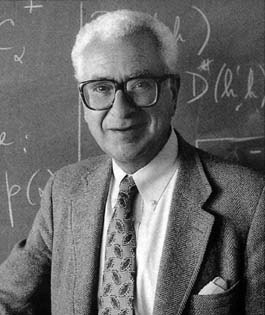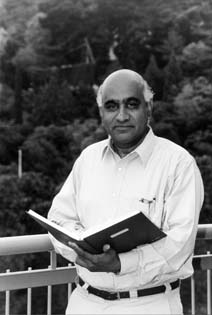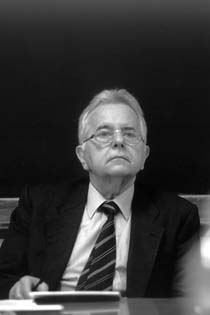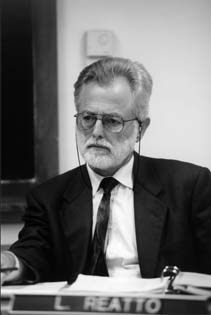Personal tools
News from ICTP 93 - Dateline

There is an unusual link between Trieste, the stately city where
ICTP was established and still flourishes, and the exotic field
of subnuclear particles. Almost everyone knows that a quark is
the most elementary particle of matter. The name was coined in
the 1960s by the distinguished theoretical physicist and Nobel
Laureate (1969) Murray Gell-Mann, who took it from James Joyce's
Finnegans Wake. For Gell-Mann, however, the word was pronounced
'quork;' for Joyce, the word was meant to rhyme with 'dark.' Dublin-born
Joyce, one of the most innovative writers of the 20th century,
spent more than 10 years in Trieste, teaching English at the Berlitz
School. In Trieste, Joyce began to write his masterpiece, Ulysses.
Surely, he would have been delighted but perplexed by the strange
use--and sound--of his word "quarks" by modern physicists.

Murray Gell-Mann
The latest news about quarks arrived last February from CERN,
the European Organization for Nuclear Research located near Geneva,
Switzerland. Researchers from CERN's heavy ion programme presented
compelling evidence for the existence of a new state of matter
in which quarks, instead of being bound into more complex particles
such as protons and neutrons, are free to roam. The same 'wanderlust'
principle may hold true for gluons, the particles that bind quarks
together like 'glue' to create quark-gluon plasma.
Theory predicts that this state of matter must have existed microseconds
after the Big Bang, before the formation of matter as we know
it today. The findings of the CERN researchers represent the first
time that such a theory has been confirmed experimentally.
The new 'bridge' between the particles' world and cosmology offers
intriguing proof of the unity of the universe as a whole-a concept
that has sparked the imagination of many specialists in high energy
physics working at ICTP.
Recognition from The Royal Society

T.V. Ramakrishnan, a member of the ICTP Scientific Council,
and M.S. Raghunathan, recently appointed a staff associate
of the ICTP Mathematics Group, have both been elected Fellows
of The Royal Society. Ramakrishnan, who is a professor of physics
at the Indian Institute of Science in Bangalore, India, is an
internationally renowned researcher in the field of condensed
matter physics and statistical mechanics. Raghunathan, who is
a distinguished professor at the Tata Institute of Fundamental
Research in Mumbai, India, is an expert on algebraic and discontinuous
groups. Ramakrishnan recently thanked the Centre for the contribution
it has made to his career, particularly when he was a young researcher.
In a letter to the ICTP director, he wrote: "I have been
very fortunate in my association with people and places such as
ICTP, which was important for my continued activity and growth,
especially in the 1970s." For an in-depth discussion of Ramakrishnan's
view on the state of scientific research in India, see News
from ICTP, Summer 1999. Ramakrishnan and Raghunathan were
among 48 distinguished scientists from around the world elected
to The Royal Society this year. Membership in the Society currently
totals 1293.
InterAcademy Panel Comes to Trieste
The Third World Academy of Sciences (TWAS), part of the legacy
of ICTP founder Abdus Salam, has been chosen to host the secretariat
of the InterAcademy Panel (IAP). The decision was made at the
Conference of the World's Scientific Academies, "Transition
to Sustainability in the 21st Century," held in Tokyo, Japan,
in May. The purpose of IAP, which was created in 1995, is to foster
co-operation, networking and capacity-building among scientific
academies and to strengthen the voice of academies in discussions
of science-related issues in both national and international fora.
IAP membership currently consists of 80 scientific academies worldwide.
For the past five years, the secretariat has been located at The
Royal Society in London. The relocation of the secretariat to
Trieste has received strong support from Italian officials at
all levels of government. Several sites are now under consideration
for a permanent home for IAP, which will be located with TWAS
at the same site. Until the move takes place, IAP secretariat
will be housed in offices at ICTP.
Dignity, Science and the Third World

Nicola Cabibbo
"Abdus Salam helped to instill a sense of dignity among
Third World scientists," observes Nicola Cabibbo,
who represented the Italian government at the last meeting of
the ICTP Scientific Council in April. A leading theoretical physicist
at the University of Rome La Sapienza, Cabibbo is well
versed in the political, social and cultural aspects of science.
Former president of INFN (Istituto Nazionale di Fisica Nucleare,
the Italian National Institute of Nuclear Physics) and ENEA (Ente
per le Nuove tecnologie, I'Energia e I'Ambiente, the Italian
Agency for New Technologies, Energy and the Environment), Cabibbo
currently heads the Accademia Pontificia delle Scienze,
the Pontifical Academy of Sciences, a scientific advisory panel
for the Vatican. Salam was also a member.
What does dignity mean for a scientist from the developing world?
Cabibbo explains: "It means not merely to maintain a good
scientific level, but to be heard and respected in one's own country.
It means not to be discriminated against in international scientific
journals. It means to feel part of a larger community despite
hailing from a country where political elites rarely display interest
in science and where science rarely has a practical impact on
society. Thanks to ICTP, these scientists share a common home
away from home."
One of the major problems in the Third World is the lack of quality
scientific libraries. A good technical library requires an annual
budget of hundreds of thousand dollars-an impossible expense for
a poor country. But Cabibbo is confident that the solution can
come from the internet, whose costs are becoming lower and lower.
"By using a network of satellites in geosynchronous orbit,"
he says, "we could connect all Third World countries via
the internet, even if many of these countries do not have reliable
telephone lines. Such efforts could provide scientists in remote
regions with access to the archives of the best electronic libraries
in the world and offer them a way to communicate with their colleagues
via e-mail even when separated by continents and oceans."

Luciano Reatto
Luciano Reatto, professor of physics at the University
of Milan and long-time visitor to the Centre, agrees that new
technologies will help scientists from developing countries overcome
the isolation that often poses the most serious obstacle to building
a successful career. For instance, he emphasises the potential
offered by remote sensing, a tool that can inexpensively provide
a treasure trove of detailed scientific information about a region
or area.
"But don't ignore the value of more theoretical investigations,"
Reatto warns. "The study of mathematics, statistical mechanics
and complex systems could provide important insights into critical
interdisciplinary issues not only in industrialised nations but
in developing countries as well."
Reatto, who represented the INFM, the Istituto Nazionale per
la Fisica della Materia (Italian National Institute for the
Physics of Matter) at the ICTP Scientific Council meeting, also
stresses the importance of the recent agreement between ICTP and
INFM that sets the stage for increasing the number of young scientists
who may pursue research in both institutions under a co-operative
exchange programme.
"Condensed matter physics is an important topic for developing
countries," he notes. Theoretical studies in this field have
potential implications for electronics, advanced materials and
computer science.
"ICTP has a renowned theoretical staff in this field and
a long and successful track record of training and research programmes.
The agreement between the Centre and INFM will offer new opportunities
for scientists from the Third World to become more knowledgeable
about the state-of-the-art of science and technology in this field.
At the same time, scientists from developed countries will become
better acquainted with issues that are most relevant to their
counterparts from the developing world. That's exactly the kind
of exchange that has earned ICTP a reputation for serving as a
viable scientific bridge between the South and North."